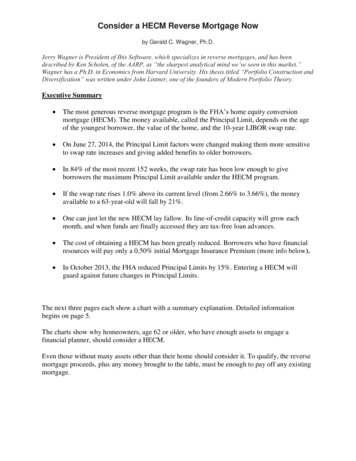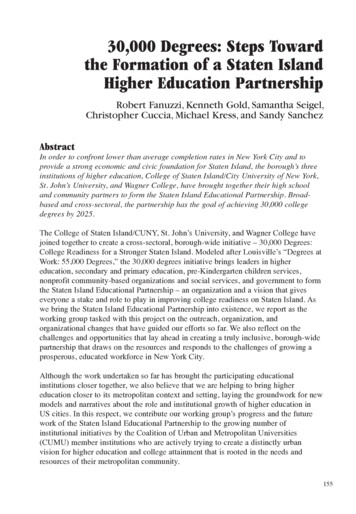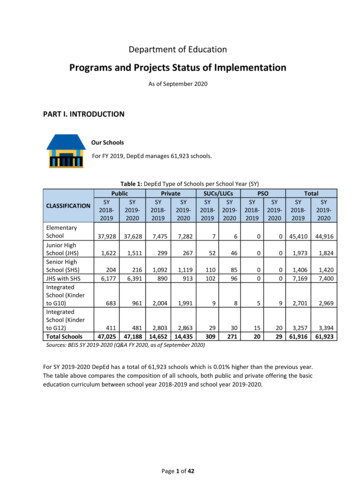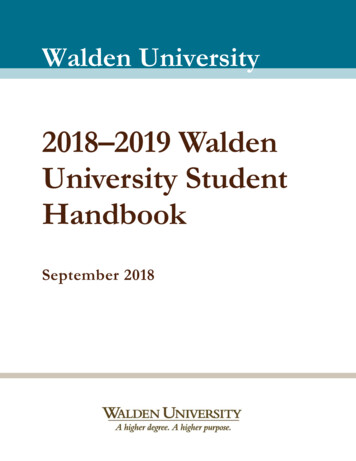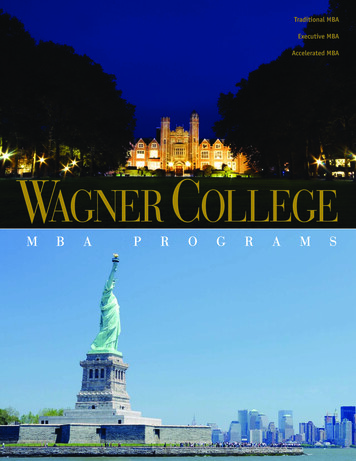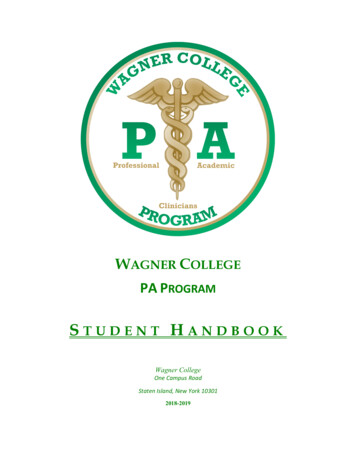
Transcription
WAGNER COLLEGEPA PROGRAMSTUDENT HANDBOOKWagner CollegeOne Campus RoadStaten Island, New York 103012018-2019
TABLE OF CONTENTSCONTENTSMission StatementPAGE2-3Code of Ethics4History of the Program5PA Role6Program Contact Names7Calendar8Program Overview9-10Goals & Objectives of the Program11-15Technical Standards16-18Policies & Procedures19-39Didactic Phase - (Year I)40-43Clinical Phase - (Year II)44-45Graduate Phase - (Year III)46Course Descriptions47-57Required Medical Textbooks58-62Required Medical Equipment63Graduation Procedures64Declaration of Understanding65Remediation & Deceleration Flow ChartAdditional Information for Students66-6970
MISSION STATEMENTTo prepare‘professional academic clinicians’committed to quality healthcarefor all individuals.Page 2
PA PROGRAMMISSION STATEMENTTo prepare professional academic clinicianscommitted to quality health care for all individuals.The curriculum of the PA Program is based on defined objectives for achieving the academic knowledge,clinical skills and professional values reflective of the PA profession.Each of the three (3) professional phases or years encompasses all 3 tenets but each of the years isdedicated to represent one of the tenets.Professional Year I (Didactic Phase) emphasizes the acquisition of academic medicalknowledge.Professional Year II (Clinical Phase) focuses on student-patient interactions and themastering of clinical skills.Professional Year III (Graduate Phase) is dedicated to advanced clinical clerkship, medicalresearch projects and professional credentialing requirements.The summative evaluation and the exit interview reflect on the meeting of all objectives anddemonstrate fulfillment of the mission statement.Code of Ethics of thePage 3
PA ProfessionPAs shall be committed to providing competent medical care, assuming as their primary responsibility the health,safety, welfare, and dignity of all humans.PAs shall extend to each patient the full measure of their ability as dedicated, empathic health care providers andshall assume responsibility for skillful and proficient transactions of their professional duties.PAs shall deliver needed health care services to health consumers without regard to sex, age, race, creed, socioeconomic and political status.PAs shall adhere to all state and federal laws governing informed consent concerning the patient’s health care.PAs shall seek consultation with their supervising physician, other health providers and qualified professionalshaving special skills, knowledge, or experience whenever the welfare of the patient will be safeguarded oradvanced by such consultation. Supervision should include ongoing communication between the physician andthe PA regarding the care of all patients.PAs shall take personal responsibility for being familiar with the adhering to all federal/state laws applicable to thepractice of their profession.PAs shall provide only those services for which they are qualified via education and/or experiences and bypertinent legal regulatory process.PAs shall not misrepresent in any manner, either directly or indirectly, their skills, training, professionalcredentials, identify, or services.PAs shall uphold the doctrine of confidentiality regarding privilege patient information, unless required torelease such information by law or such information becomes necessary to protect the welfare of the patient orthe community.PA shall strive to maintain the increase quality of individual health care services through individual study andcontinuing education.PAs shall have the duty to respect the law, to uphold the dignity of the PA profession, and to accept its ethicalprinciples. The PA shall not participate in or conceal any activity that will bring discredit or dishonor to the PAprofession and shall expose, without fear or favor any illegal or unethical conduct in the medical profession.PAs, ever cognizant of the needs of the community, shall use the knowledge and experience acquired asprofessionals to contribute to an improved community.PAs shall place service before material gain and must carefully guard against conflicts of professional interest.PAs shall strive to maintain a spirit of cooperation with their professional organizations and the general public.Membership in the Academy is an honor that confers upon the individual certain rights and responsibilities.Adherence to the AAPA Code of Ethics is a condition of members.Page 4
PA Profession: A Historical Perspective1965First formal program for training PAs was established at Duke University.1968The AAPA (American Academy of PAs), the national professional organization was formed.1971The AMA’s House of Delegates approved the Essentials of an Approved Educational Program for the Assistant to the Primary CarePhysician. A set of standards for PAs.1972The Association of PAs (APAP) was created.1973First national PA certifying exam is given by the National Board of Medical Examiners.1974The newly organized National Commission for the Certification of PAs (NCCPA) assumed responsibility for administering theNational Certifying Examination.1976Committee on Allied Health Education and Accreditation is established as an independent organization responsible for accreditingAllied Health Educational Programs (including PA Programs).1977Passage of Rural Health Clinic Services Act that required utilization of a mid-level practitioner (PAs, Nurse Practitioners and NurseMidwives). This act provided Medicare reimbursement for PA services in certified rural health clinics.1979PAs are employed in all 50 states.1987PA services are reimbursable under Medicare (Part A).1991PAs are commissioned officers in all branches of the military.1992PAs have privileges in thirty-three states. Approximately 21,000 practicing PAs in the USA1996Wagner CollegevStaten Island University Hospital PA Program received Provisional Accreditation (April 4, 1996) and admitted itsfirst class of PA students.1997The number of PA Programs surpassed 100. Approximately 30,000 practicing PA’s are in the American health workforce.1998The Commission on Accreditation (CAAHEP) certified that Wagner CollegevStaten Island University Hospital PA Program hadcompleted an accreditation review and was judged to be in compliance with the nationally established standards. The first classof the Wagner CollegevStaten Island University Hospital PA Program graduated on June 1998.2000The ARC-PA (Accreditation Review Commission on Education for the Physician Assistant, Inc.) granted the PA Program ContinuingAccreditation for five years.2002Wagner College was accredited by New York State Department of Higher Education to offer a graduate program for practicing PAswishing to receive a Master of Science degree in Advanced PA Studies.2005The Wagner College PA transitioned to a three (3) year professional program offering its graduates the Master of Science inAdvance PA Studies.ARC-PA granted Continuing Accreditation to the Wagner College PA Program until 2008.2008ARC-PA granted Continuing Accreditation to the Wagner College PA Program until 2011.2011ARC-PA granted Continuing Accreditation to the Wagner College PA Program until 2016.2012ARC-PA extended the Continuing Accreditation status to the Wagner College PA Program until 2018.2013Wagner College PA Program offers EYH trips to England and Belize.2015Wagner College PA Program offers three EYH medical education and medical mission trips to England, Belize, and Guatemala.2016ARC-PA extended the Continuing Accreditation status to the Wagner College PA Program to 2019.2018Wagner College PA Program offers four EYH medical education and medical mission trips to England, Guatemala, Peru andBotswana.Page 5
PA RolePAs are academically and clinically prepared to provide health care services with the direction andresponsible supervision of a doctor of medicine or osteopathy. The physician-PA team relationship isfundamental to the PA profession and enhances the delivery of high quality health care. Within thephysician-PA relationship, PAs make clinical decisions and provide a broad range of diagnostic,therapeutic, preventive, and health maintenance services. The clinical role of PAs includes primary andspecialty care in medical and surgical practice settings. PA practice is centered on patient care and mayinclude educational, research, and administrative activities.The role of the PA demands intelligence, sound judgment, intellectual honesty, appropriate interpersonalskills, and the capacity to react to emergencies in a calm and reasoned manner. An attitude of respect forself and others, adherence to the concepts of privilege and confidentiality in communicating withpatients, and a commitment to the patient’s welfare are essential attributes of the graduate PA. Theprofessional curriculum for PA education includes basic medical, behavioral, and social sciences;introduction to clinical medicine and patient assessment, supervised clinical practice; and health policyand professional practice issues.ARC-PA, 2016The PA is a nationally certified and state-licensed medical professional that practices medicine on ahealthcare team with physicians and other providers.PAs can take medical histories, conduct physical exams, diagnose and treat illnesses, order and interprettests, develop treatment plans, counsel on preventive care, assist in surgery, write prescriptions and makerounds in hospitals and nursing homes. The specific duties of PA depend on the setting in which theywork and their level of experience, and specialty.Before they can practice, PAs who graduate from an accredited program must pass the PhysicianAssistant National Certifying Exam (PANCE) administered by the National Commission on Certificationof Physician Assistants and get licensed by the state in which they wish to practice.In order to maintain certification, PAs must complete a recertification exam every 10 years and complete100 hours of continuing medical education (CME) every 2years. The “PA-C” after a PA’s name meansthey are currently certified.AAPA, 2016Certified PAs can address health care needs and be a patient’s trusted adviser when it comes tomaintaining or improving health.Certified PAs obtain medical histories, examine, diagnose and treat patients, order and interpretdiagnostic tests and recommend and implement treatment plans for the wide range of humanillnesses and injuries. They can perform minor surgery and assist in major surgery, instruct andcounsel patients, order or carry out therapy and prescribe medications. PAs perform theseroles within a scope of practice established by the supervising doctor in accordance withstate regulations; generally speaking, PAs can perform any task delegated by the doctor.NCCPA, 2016Page 6
PROGRAM CONTACT NAMESPROGRAM DIRECTORNora Lowy, PhD, MPA, PA-CMEDICAL DIRECTORBrahim Ardolic, MDACADEMIC COORDINATORPauline Papapietro, MS, PA-CACADEMIC COORDINATORAustin Epstein, MS, PA-CCLINICAL COORDINATORNicole Migliorini, MS, PA-CCLINICAL COORDINATORCarol Galarza, MS, PA-CCLINICAL COORDINATORDavid Lau, PA-CGRADUATE COORDINATORGail Tiburzi, MPA, PA-CGRADUATE COORDINATORRobert Marchese, MS, PA-CRESEARCH & SIMULATION LEARNINGCOORDINATORMichael Rota, MS, PA-CRESEARCH & SIMULATION LEARNINGCOORDINATORTara Igneri, MS, PA-CASSISTANT TO THE PA DIRECTOR &COORDINATOR OF GLOBAL OUTREACHAnn Ayers, BACOORDINATOR OF CLINICAL PLACEMENT& SIM LABAlaina SignorastriPA PROGRAM DEPARTMENTOffice: 718-420-4552Email: nora.lowy@wagner.eduOffice: 718-420-4151Email: brahim.ardolic@wagner.eduOffice: 718-420-4151Email: pauline.papapietro@wagner.eduOffice: 718-420-4554Email: austin.epstein@wagner.eduOffice: 718-420-4151Email: n.migliorini@wagner.eduOffice: 718-390-3451Email: carol.galarza@wagner.eduOffice: 718-420-4151Email: david.lau@wagner.eduOffice: 718-420-4160Email: gail.tiburzi@wagner.eduOffice: 718-420-4153Email: robert.marchese@wagner.eduOffice: 718-420-4596Email: michael.rota@wagner.eduOffice: 718-420-4556Email: tara.igneri@wagner.eduOffice: 718-420-4142Email: aayers@wagner.eduOffice: 718-420-4538Email: alaina.signorastri@wagner.eduOffice: 718-420-4151Email: paprogram@wagner.eduPage 7
CALENDARScholastic Schedule 2018-2019Didactic, Clinical & Graduate PhasesPlease note the schedule for the upcoming semesters:Summer ’18– Spring ’19:Orientation DaySummer ‘18June 8, 2018 – May 10, 2019June 8, 2018June 11 – August 8, 2018Summer Lectures, Labs & SCPEsJune 11 – Aug. 8,August 9, 2018Reading Day2018August 10, 2018Make-Ups/Final ExamsAugust 11 – 19, 2018(Vacation)August 20 – December 12, 2018Fall Lectures, Labs & SCPEsAug. 20- Dec. 14,December 13, 2018Reading Day2018December 14 & 17, 2018Make-Ups/Final ExamsDecember 18 – January 6, 2019(Vacation)January 7 – May 8, 2019Spring Lectures, Labs & SCPEs(March 3 – March 10, 2019)(Vacation)May 9, 2019Reading DayMay 10 & 13, 2019Make-Up/Final ExamsSeptember 3, 2018Labor DaySeptember 10, 2018Rosh Hashanah (No Exams)September 19, 2018Yom Kippur (No Exams)Vacation/October 8, 2018Columbus DayNo ExamsNovember 22 – November 25, 2018Thanksgiving WeekendJanuary 21, 2019Martin Luther King DayFebruary 18, 2019President’s DayApril 19 – April 22, 2019Easter HolidayFall ‘18Spring ‘19Jan. 7- May 8, 2019Commencement9wks17wks18wksMay 10, 2019Page 8
W a g n e r C o l l e g e PA ProgramProgram OverviewMissionThe mission of the three-year BS/MS Wagner College PA Program is to prepare professionalacademic clinicians committed to quality health care for all individuals.Program Overview (A3.14a)The Wagner College PA Program is accredited by the New York State Department of Educationand the Accreditation Review Commission on Education for the Physician Assistant (ARC-PA).The Accreditation Review Commission on Education for the Physician Assistant (ARC-PA) hasgranted Accreditation-Continued status to the Wagner College PA Program sponsored byWagner College. Accreditation-Continued is an accreditation status granted when a currentlyaccredited program is compliance with the ARC-PA Standards.Accreditation remains in effect until the program closes or withdraws from the accreditationprocess or until accreditation is withdrawn for failure to comply with the Standards. Theapproximate date for the next validation review of the program by the ARC-PA will be 2019.The review date is contingent upon continued compliance with the Accreditation Standards andARC-PA policy.The Wagner College PA Program is committed to preparing future professionals possessingsound academic knowledge and proficiency in clinical skills, requisite for providing andpromoting quality healthcare for all individuals. The program is dedicated to the advancement ofPA education, promotes service to the community and, emphasizes the acquisition of theknowledge and skills required of the PA functioning in a dynamic healthcare environment.The Wagner College PA Program is committed to preparing future professionals possessingsound academic knowledge and proficiency in clinical skills, requisite for providing andpromoting quality healthcare to all individuals. The program is dedicated to the advancement ofPA education, promotes service to the community and, emphasizes the acquisition of theknowledge and skills required of the PA functioning in a dynamic healthcare environment.The three-year BS/MS Program in PA Studies is a comprehensive program of didactic(academic), clinical and research (graduate) work that reflects upon the academic, clinical, andprofessional skills required of the PA. Students completing the prescribed three-year program inPA studies receive their BS and MS degrees and are eligible to take the national certifyingexamination leading to the title of PA-C (Certified PA).Page 9
The Didactic Phase (Year I) includes classroom and laboratory instruction in the MedicalSciences (such as Clinical Anatomy, Medical Physiology, Medical Microbiology,Pathophysiology and Human Genetics); Clinical Preparatory Sciences (such as PatientAssessment, Radiology Interpretation, Primary Care & Pharmacotherapeutics, GeneralMedicine); and PA Professional Practice. Clinical exposure begins in the didactic phase of theprogram by providing for experiences with interview skills and performance of physicalexaminations in a variety of clinical settings. That clinical exposure extends into the ClinicalPhase (Year II) with the introduction of supervised clinical experiences and further developed inthe Graduate Phase (Year III) with elective clerkships.The structured Clinical Phase takes place at affiliated clinical institutions - hospitals, outpatientclinics, private offices and other in-state and out-of-state sites. The Clinical Phaseprovides students with full-time, direct patient care in outpatient, inpatient, surgicaland emergency settings with patients across the life span. The clinical experiences are intensive,supervised, hands-on learning experiences in various medical and surgical areas. Thesesupervised clinical rotations are in various disciplines such as emergency medicine, internalmedicine; pediatrics; surgery; primary care, psychiatry/behavioral medicine and women’shealth. All clinical experiences emphasize the provision of diagnostic, therapeutic and healthmaintenance services.Graduate level courses are introduced in the second year of the program and extended into thethird year or Graduate Phase to fulfill the requirements for the Master of Science degree. Thesecourses provide the PA with the knowledge and skills required for professional and careerdevelopment. In keeping with the philosophy of PA education, the graduate phase consists ofdidactic coursework that is complemented with clinical experiences including electiveclerkships.Clerkship experiences are available in elective clinical areas of unique interest to each student.Examples include community medicine, family medicine, forensic medicine, medicalsubspecialties (cardiology, dermatology, electrophysiology, gastroenterology, hematologyoncology, infectious disease, neurology and pain management); pediatric subspecialty;psychiatry; surgical subspecialties (burn unit, cardiothoracic surgery, ENT surgery,neurosurgery, orthopedics, plastic surgery, surgical intensive care, trauma, and urology); andwomen’s health.The requirements for the Master of Science include the development of a thesis research project.The proposal for the thesis must be approved by the department and either a hospital IRB(Institutional Review Board) or college HERB (Human Experimental Review Board) prior to itsimplementation. The final thesis, approved by the Research Committee, is presented at PosterPresentations and defended at the Annual Research Forum.Upon completion of the PA Program, students are awarded a Bachelor of Science and Master ofScience in Advanced PA Studies from Wagner College and a PA Certificate of Completion fromthe Wagner College PA Program. National certification for clinical practice is granted by passingthe PANCE (Physician Assistant National Certifying Exam). Licensure is under the supervisionof each state.Page 10
GOALS OF THE PA PROGRAMThe goals of the Wagner College PA Program are to:I.Integrate the three tenets of academic knowledge, clinical skills and professionalisminto a comprehensive curriculum that prepares future competent professionals.II. Facilitate through a sequential ‘building block’ curriculum the acquisition ofknowledge for the successful completion of the program.III. Provide learning experiences that promote the development of critical thinking andmedical decision making skills.IV. Enhance clinical competencies by providing experiences in a spectrum of settingswith patients across the lifespan requiring varying aspects of patient care.V. Guide the development of professionally relevant research projects leading to thedissemination of findings at public forums and at a thesis defense.The program defines its success by demonstrating the achievement of the above goals.The Wagner College PA Program aims to provide a comprehensive program that integrates theacademic, clinical and professional components that will prepare the PA to perform as a competentprofessional provider of quality care.The Program maintains an on-going qualitative assessment in order to implement that which isnecessary to meet or exceed the standards outlined in the “Accreditation Standards for PA Education”.OBJECTIVES OF THE PROGRAMThe Program has set forth objectives that will prepare students to perform functions and tasks expectedof PA’s with competency and proficiency.Objective #1:The graduate will achieve knowledge and skills in history taking andperforming physical examinations.1.1 Develop a rapport with the patient and family that will enhance thehistory taking procedure.1.2 Obtain and record a complete and accurate history:ÒÒÒÒChief ComplaintHistory of Present IllnessPast Medical HistoryCurrent Health StatusÒÒÒFamily HistoryReview of SystemsPsychosocial HistoryPage 11
1.3 Perform a complete and thorough physical examination.a. Demonstrate appropriate methods for developing patientconfidence and trust during the physical examination.b. Carry out a comprehensive systematic physical exam.General SurveyVital SignsSkin, Hair & NailsHEENTThorax & LungsCardiovascularc.AbdomenBreast & AxillaeGenitaliaMusculoskeletalPeripheral VascularNeurologicalDistinguish normal from abnormal physical examinationfindings.d. Use the following instruments effectively and safely in collectinghealth status data:Ò StethoscopeÒ SphygmomanometerÒ OtoscopeÒ OphthalmoscopeObjective #2:Ò Tuning ForkÒ Reflex hammerÒ Measuring TapeÒ Other portable and/oroffice based devicesThe graduate will achieve the knowledge and skills required for assessing laboratoryand diagnostic studies.2.1. Formulate a problem list and/or a differential diagnosis for eachpatient complaint.2.2. Identify the appropriate diagnostic tests and procedures indicated indetermining the correct diagnosis.2.3. Discuss with the patient the benefits and risks associated with thediagnostic tests and procedures.2.4. Demonstrate the appropriate skills required in collecting routinespecimens including but not limited to the following:ÒÒÒÒÒÒÒÒÒBacteriological samplesBlood (arterial, capillary, venous)Gastric contentsSpinal fluidSputumStool samplesSynovial samplesUrethral smears/culturesUrine samplesPage 12
2.5. Interpret the results and discuss the implications of basiclaboratory tests, including but not limited to the following:Ò Automated Blood & Serum Chemistry PanelsÒ Complete Blood Count with DifferentialÒ Complete UrinalysisÒ Cultures & Sensitivities of various specimensÒ Erythrocyte Sedimentation Rate & C-Reactive ProteinsÒ Gram Stains of various specimensÒ Pregnancy TestsÒ Stool for Occult Blood, Ovum, and ParasitesÒ Vaginal & Cervical specimen analysis2.6. Take and Interpret:Ò EKG Rhythm StripsÒ 12 Lead EKGs2.7. Identify and interpret common blood gas disorders:ÒÒÒÒMetabolic Acidosis & AlkalosisRespiratory Acidosis & AlkalosisSecondary acid-base disordersPulmonary Function Tests2.8. Order and perform basic interpretations of radiological studies of thechest, abdomen, pelvis, skull and extremities.2.9. Understand the uses of the following imaging modalities:ÒÒÒÒÒObjective #3:AngiographyBronchoscopyCT yFluoroscopyMRINuclear Medicine StudiesUltrasoundThe graduate will achieve the knowledge and skills in formulating the most likelydiagnoses.3.1. Utilize problem solving and medical decision making skills.3.2 Integrate history, physical, laboratory and other findings to develop anappropriate differential diagnosis.Objective #4:The graduate will achieve knowledge and skills in clinical intervention.4.1 Perform clinical interventions appropriate for patient needs.4.2 Carry out appropriate clinical techniques. (See “Procedure List”)4.3 Understand the indications and possible complications of clinicalinterventionsPage 13
Objective #5:The graduate will achieve the knowledge and skills relevant to clinical therapeutics.5.1. Identify, and where appropriate, order medications used in thetreatment of common health conditions,5.2. Demonstrate knowledge of drugs to include indications,contraindications, mechanisms of action, and side effects.5.3. Understand the challenges or difficulties patients may have incomplying with prescribed treatment regimens.5.4. Recognize the rights of patients to be informed regarding nature andchoices of treatment, costs, risks vs. benefits and available resources.Objective #6:The graduate will achieve the knowledge and skills relevant to health maintenance.6.1 Communicate effectively and professionally within a patient centeredhealth care team with patients, their families and other health carepersonnel.6.2 Teach/counsel patients regarding the diagnosis, prognosis andtreatment in an understanding and professional manner.6.3 Teach patients about self-breast examinations,examinations, and skin cancer examinations.self-testicular6.4 Teach, counsel, inform, and assist with understanding and preparationof advance directives and with the designation of a health care proxy.6.5 Demonstrate professional concern regarding the effects that healthproblems have on the patient/family structure and lifestyles.6.6 Develop an objective perspective that will allow appropriate andsupportive therapeutic intervention into the patient’s health problems.6.7 Understand and discuss the effects of the physical, psychological,sociocultural and economic factors relating to the patient’s healthstatus on the patient and family.6.8 Utilize patient/family education in providing the knowledge needed tomaximize the health status of the patient.6.9 Demonstrate professional discretion in protecting the right of thepatient to privacy and confidentiality of privileged information.Objective #7:The graduate will achieve the knowledge and skills for applying clinically the learnedand acquired scientific concepts.Objective #8:The graduate will demonstrate application of knowledge and skills corresponding tothe following systems:Ò CardiologyÒ Infectious DiseasePage 14
iveTo fulfill the above objectives, it is required that the student log all patient encounters and requiredprocedures. The student is required to complete and document a minimum of 2,000 clinical hours and1,000 patient encounters over the 2 years of supervised clinical experiences and clerkships. Meeting therequirement will necessitate the logging of patients during each of the supervised clinical experiences in atimely manner. The student is also expected to document the successful performance of all requiredprocedures. Students who fail to meet the minimum of 1000 patient encounters and the requiredprocedures will be ineligible for graduation.PROCEDURE COMPETENCY LISTPROCEDUREREQUIREMENTPROCEDUREREQUIREMENTACLS 1Incision & drainage 1Anterior Nasal Packing 1Intradermal injection 3Page 15
Arterial Puncture 6NG tube placement 3BCLS 1Pelvic exam/PAP smear 6Chest Tube irrigation/removal 1Peripheral IV 12Dressing Change/Wound Care 6Perform CPR 1Ear Care 1Subcutaneous injection 3EKG 3Staple/suture removal 6Eye Care 1Suturing 6Gastric Lavage 3Urinary Catheter 6IM Deltoid/Gluteal Injections 6Urinary Catheter 6Immobilization/Splinting/Casting 6Venous Puncture 6T E C H N I C A LS T A N D A R D SINTRODUCTIONThe PA must have the knowledge and skills to function in a broad variety of clinical situations and torender a wide spectrum of patient care. Accordingly, the granting of a degree to a PA student signifiesthat the holder is an individual prepared for practice as a PA. In such a professional role the PA canprovide medical services with the supervision of a physician in accordance with the applicable laws ofmedical practice. The services must, for the safety and welfare of the patient, be of the sameprofessional quality that would be rendered by the supervising physician.Candidates for the PA profession must have the somatic sensation and functional use of the sense ofvision and hearing. Candidates’ diagnostic skills will also be lessened without the functional use of thesenses of equilibrium, smell and taste. Additionally, they must have sufficient exteroceptive sense(touch, pain and temperature), sufficient motor function to permit them to carry out the activitiesdescribed in the sections that follow. They must be able to integrate all information received bywhatever sense(s) employed, consistently, quickly, and accurately, and they must have the intellectualability to learn, integrate, analyze and synthesize data.The candidate for the PA profession must have abilities and skills of five varieties includingobservation, communication, motor, intellectual, conceptual & integrative - quantitative, andbehavioral & social. Technological compensation can be made for some handicaps in certain of theseareas, but such a candidate should be able to perform in a reasonably independent manner.OBSERVATIONPage 16
The candidate must be able to observe demonstrations and experiments in the basic sciences, includingbut not limited to physiologic and pharmacological demonstration in animals, microbiologic cultures,and microscopic studies of microorganisms and tissues in normal and pathologic states. A candidatemust be able to observe a patient accurately at a distance and close at hand. Observation necessitatesthe functional use of the sense of vision and somatic sensation. It is enhanced by the functional use ofthe sense of smell.COMMUNICATIONA candidate should be able to speak, to hear, and to observe patients in order to elicit information,describe changes in mood, activity and posture, and perceive nonverbal communications. A candidatemust be able to communicate effectively and sensitively with patients. Communication includes notonly speech but reading and writing. The candidate
2011 ARC-PA granted Continuing Accreditation to the Wagner College PA Program until 2016. 2012 ARC-PA extended the Continuing Accreditation status to the Wagner College PA Program until 2018. 2013 Wagner College PA Program offers EYH trips to England and Belize. 2015 Wagner College PA Program offers three EYH medical education and medical .
